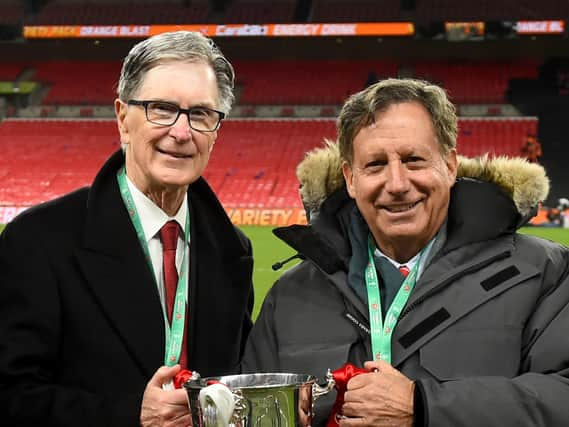FSG could become £100 billion business if they complete deal - and how it could impact Liverpool


Liverpool owners Fenway Sports Group (FSG) can become a company worth £100 billion if they complete their latest deal.
That is the verdict of Simon Jordan, the former Crystal Palace owner speaking on talkSPORT earlier this week.
Advertisement
Hide AdAdvertisement
Hide AdFSG have joined forces with several businessmen and investment firms to forge the Strategic Sports Group (SSG) about investing in the PGA Tour. They include Tom Ricketts, the owners of MLB team the Chicago Cubs, and Gerry Cardinale, whose RedBird Capital Partners purchased an 11% stake in FSG in April 2021.
The PGA have also in talks with the Saudi Arabia-owned LIV Golf - who recently poached Jon Rahm in a deal worth a reported £450 million - about a potential merger since the summer.
Along with owning Liverpool since 2010, FSG are also in charge of MLB outfit the Boston Red Sox and NHL team the Pittsburgh Penguins, while they purchased a franchise - named Boston Common - in the newly-formed Technology Golf League.
Jordan believes that FSG's interest in the PGA is because of the media rights that will be involved - and that will increase the value of the business markedly. He said "No-one disputes the power and economic might of a £650 billion sovereign wealth fund. In order to have a conversation, you have got to give yourself a variety of perceived alternatives that make you have some footing in the conversation or you'll get what you're given.
Advertisement
Hide AdAdvertisement
Hide Ad"[It's a] Huge media play. If they start grabbing golf media rights - look at what Fenway did with RedBird selling a part of Liverpool and the capitalisation of that. If you start to wrap other sports' media rights in there, all of a sudden you might have a £100 billion business.
"You're talking about the perception of one golfer getting paid $450 million and funded by one regime that doesn't have any interest in the economic viability. The PGA are trying to run an economically viable tour. It depends how much you want the Saudis prepared to allow the Saudis however much they want to destabilise the values of golf. I don't just mean the economic landscape that maybe needed to be rejigged anyway but the principals of the core tournaments - whether the majors are played in because they're currently excluded or whether the Ryder Cup stands its ground. That won't be perceived by the golfing world as a great achievement
"Golf is built on a perception of all of the different values of the tournaments you play in and it's not going to be difficult to find a solution to be able to incorporate other tours. The challenge is if the American government was; going: 'Easy cowboy, that's not how we role' this deal would have been done. The PGA would have been given what they're given, they've clearly got into bed with the Saudis and recognised the economic might is something they need to harness and n turn into an advantage and can see the challenge in front.
"But that's not the battle being fought here. The reason why Henry and his guys are in the mix is because they see a media opportunity. Media sports rights are huge and there might be an opportunity to throw more money into the PGA and all of a sudden if you're able to give star players £250-300 million to play on the PGA, where is LIV? Are LIV going to go to £1 billion."
Advertisement
Hide AdAdvertisement
Hide AdAsked how a deal with the PGA could impact Liverpool, Jordan replied: "Nothing. What does Liverpool spend? They ringfence their own money. John Henry is not a prolific spender. Klopp built his best team on the sale of Coutinho. They tend to be quite economical in what they spend.
"But if he's incorporating that into a media structure and reversing that into a listed business and then valuing it at 50 times its revenue, they're creating more opportunities, not less."
Comment Guidelines
National World encourages reader discussion on our stories. User feedback, insights and back-and-forth exchanges add a rich layer of context to reporting. Please review our Community Guidelines before commenting.